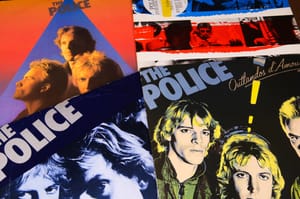More details have emerged about the big royalties dispute between Sting and his former bandmates in The Police which has now resulted in legal proceedings through the UK courts. The dispute centres on a 1970s agreement about how the band share publishing income generated by their songs.
Guitarist Andy Summers and drummer Stewart Copeland have together sued frontman Sting, aka Gordon Sumner, accusing their former bandmate of incorrectly interpreting that 1970s agreement in a way that has short changed them out of £1.5 million in royalty payments.
According to the BBC, Sting claims that, under the band agreement, he only has to share mechanical rights income with Summers and Copeland, while the other two bandmates say the royalty share arrangement also applies to performing rights income.
Although Summers and Copeland both wrote some songs that appeared on The Police’s albums between 1978 and 1983, Sting was the band’s primary songwriter and wrote all the big hits. Including the really big hit, ‘Every Breath You Take’, which - it’s often claimed - is one of the most played songs of all time on radio, despite being an anthem about a crazed stalker.
The hits continue to be big earners and not just because of all that radio airplay. ‘Every Breath You Take’ has close to three billion streams on Spotify alone. All of which helped Sting cash in to the tune of a reported $300 million in a catalogue sale to Universal Music in 2022.
It was perhaps that headline grabbing mega-deal that reminded Summers and Copeland just how lucrative those Police hits still are, and prompted them to poke back through the deals they had done 40+ years back
The new lawsuit provides some insight about the 1970s agreement. Seemingly aware that having just one member who writes the hits can cause tensions within a band - as that member enjoys the second publishing revenue stream in addition to any recording royalties that the band members share - a song royalty share arrangement was agreed.
The initial oral agreement - later put into writing in 1981 - was that, where one band member was the writer of a song, they would share a portion of the publishing income with the other band members, usually about 15%.
Exactly what publishing income the agreement applied to was apparently less clear and is the crux of the dispute. Was it solely mechanical rights income, which in the UK is managed and controlled by the writer’s publisher? Or did it also cover performing rights income that is managed and controlled by the writer’s collecting society, which in the UK is normally handled by PRS?
Traditionally the main mechanical rights revenue stream for songwriters came from the publishing cut on CD and record sales, collected in the UK by MCPS and then paid to the publisher. Performing rights includes broadcast and live performance, with PRS collecting the money and then paying half to the publisher and half to the writer.
Streaming, somewhat confusingly, exploits both mechanical rights and performing rights, with some of the money flowing through the publisher and some through PRS.
It’s not clear why the dispute over whether or not the 1977 agreement covers performing rights as well as mechanical rights has kicked off now. The agreement was revised in 1995 and again in 2016. And while performing rights have become more lucrative in the last decade with the rise of streaming, all that radio airplay would already have been bringing in fairly decent money.
Attempts to settle the dispute out of court have seemingly failed, hence the ongoing litigation. Summers and Copeland are seeking the £1.5 million they reckon they are owed, while Sting’s lawyers claim that, if anything, their client has overpaid his former bandmates and in fact they probably owe him money.

